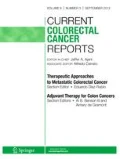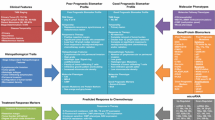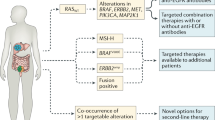Abstract
In parallel with our growing understanding of the molecular pathways underlying colorectal neoplasia, significant advances have been made in the treatment of colorectal cancer (CRC). For the past few decades, 5-fluorouracil-based therapy has been the cornerstone of adjuvant therapy. More recently, additional cytotoxic drugs and molecular-targeted therapies have provided additional clinical benefit in certain patient populations. Unfortunately, overall survival remains about 45%. Notably, our understanding of why certain patients do or do not respond to treatment remains limited. Thus, as therapeutic options for CRC continue to expand, there is now an even greater imperative to identify reliable biomarkers that have the potential to predict prognosis as well as response to chemotherapy. In this review, we will summarize the current status of such molecular prognostic and predictive biomarkers in CRC and assess their usefulness in tailoring therapeutic options.
Similar content being viewed by others
References
Papers of particular interest, published recently, have been highlighted as: • Of importance •• Of major importance
Jemal A, Siegel R, Ward E, et al. Cancer statistics, 2009. CA Cancer J Clin. 2009;59:225–49.
O’Connell JB, Maggard MA, Ko CY. Colon cancer survival rates with the new American joint committee on cancer sixth edition staging. J Natl Cancer Inst. 2004;96:1420–5.
Andre T, Boni C, Navarro M, et al. Improved overall survival with oxaliplatin, fluorouracil, and leucovorin as adjuvant treatment in stage II or III colon cancer in the MOSCIA trial. J Clin Oncol. 2009;27:3109–16.
Goldberg RM. Therapy for metastatic colorectal cancer. Oncologist. 2006;11:981–7.
Hurwitz H, Fehrenbacher L, Novotny W, et al. Bevacizumab plus irinotecan, fluorouracil, and leucovorin for metastatic colorectal cancer. N Engl J Med. 2004;350:2335–42.
•• Karapetis CS, Khambata-Ford S, Jonker DJ, et al. K-ras mutations and benefit from cetuximab in advanced colorectal cancer. N Engl J Med 2008; 359:1757–1765. This article demonstrated KRAS’ predictive value in patients with mCRC receiving cetuximab, an EGFR inhibitor.
Atkinson AJ, Colburn WA, DeGruttola VG, et al. Biomarkers and surrogate endpoints: preferred definitions and conceptual framework. Clin Pharmacol Ther. 2001;69:89–95.
Vogelstein B, Fearon ER, Hamilton SR, et al. Genetic alterations during colorectal-tumor development. N Engl J Med. 1988;319:525–32.
• Grady WM, Carethers JM. Genomic and epigenetic instability in colorectal cancer pathogenesis. Gastroenterology 2008; 135:1079–1099. This article is a comprehensive review of genetic and epigenetic changes that occur during CRC development and metastasis.
Ribic CM, Sargent DJ, Moore MJ, et al. Tumor microsatellite-instability status as a predictor of benefit from fluorouracil-based adjuvant chemotherapy for colon cancer. N Engl J Med. 2003;349:247–57.
Popat S, Hubner R, Houlston RS. Systematic review of microsatellite instability and colorectal cancer prognosis. J Clin Oncol. 2005;23:609–18.
Tejpar S, Bosman F, Delorenzi M, et al. Microsatellite instability (MSI) in stage II and III colon cancer treated with 5FU-LV or 5FU-LV and irinotecan (PETAC 3-EORTC 40993-SAKK60/00 trial). J Clin Oncol. 2009;27:15s. [Abstract: 4001]. Presented at the 2009 Annual Meeting of the ASCO. Orlando, Florida; May 29–June 2, 2009.
•• Sargent DJ, Marsoni S, Monges G, et al. Defective mismatch repair as a predictive marker for lack of efficacy of fluorouracil-based adjuvant therapy in colon cancer. J Clin Oncol 2010; 28:3219–26. This article demonstrated dMMR’s prognostic value in stage II and III CRC.
Bertagnolli MM, Niedzwiecki D, Compton CC, et al. Microsatellite instability predicts improved response to adjuvant therapy with irinotecan, fluorouracil, and leucovorin in stage III colon cancer: cancer and leukemia group B protocol 89803. J Clin Oncol. 2009;27:1814–21.
Ogino S, Meyerhardt JA, Irahara N, et al. KRAS mutation in stage III colon cancer and clinical outcome following intergroup trial CALGB 89802. Clin Cancer Res. 2009;15:7322–9.
Andreyev HJ, Norman AR, Cunningham D, et al. Kirsten ras mutations in patients with colorectal cancer: the multicenter “RASCAL” study. J Natl Cancer Inst. 1998;90:675–84.
Andreyev HJ, Norman AR, Cunningham D, et al. Kirsten ras mutations in patients with colorectal cancer: the “RASCAL II” study. Br J Cancer. 2001;85:692–6.
Roth AD, Tejpar S, Delorenzi M, et al. Prognostic role of KRAS and BRAF in stage II and III resected colon cancer: results of the translational study on the PETACC-3, EORTC 40993, SAKK 60–00 trial. J Clin Oncol. 2010;28:466–74.
•• Amado RG, Wolf M, Peters M, et al. Wild-type KRAS is required for panitumumab efficacy in patients with metastatic colorectal cancer. J Clin Oncol 2008; 26:1626–34. This article demonstrated KRAS’ predictive value in patients with mCRC receiving panitumumab, an EGFR inhibitor.
Bokemeyer C, Bondarenko I, Hartmann JT, et al. Biomarkers predictive for outcome on patients with metastatic colorectal cancer treated with first-line FOLFOX4 plus or minus cetuximab: updated data from the OPUS study [Abstract: 428]. Presented at the 2010 Gastrointestinal Cancers Symposium. Orlando, Florida; January 22–24, 2010
Kohne C, Stroiakovski D, Chang-chien C, et al. Predictive biomarkers to improve treatment of metastatic colorectal cancer; outcomes with cetuximab plus FOLFIRI in the CRYSTAL trial. J Clin Oncol. 2009;27:15s. [Abstract: 4068]. Presented at the 2009 Annual Meeting of the ASCO. Orlando, Florida; May 29–June 2, 2009.
Van Cutsem E, Rougier P, Kohne C, et al. A meta-analysis of the CRYSTAL and OPUS studies combining cetuximab with chemotherapy as 1st line treatment for patients with metastatic colorectal cancer: results according to KRAS and BRAF mutation status. Eur J Cancer. 2009;7:324. [Abstract: 6077]. Presented at the 2009 ECCO/ESMO Multidisciplinary Congress Meeting. Berlin, Germany; September 20–24, 2009.
Minoo P, Moyer MP, Jass JR. Role of BRAF-V600E in the serrated pathway of colorectal tumorigenesis. J Pathol. 2007;212:124–33.
Samowitz WS, Sweeney C, Herrick J, et al. Poor survival associated with the BRAF V600E mutation in microsatellite-stable colon cancers. Cancer Res. 2005;65:6063–9.
Ogino S, Nosho K, Kirkner GJ, et al. CpG island methylator phenotype, microsatelite instability, BRAF mutation and clinical outcome in colon cancer. Gut. 2009;5858:90–6.
Van Cutsem E, Lang G, Folprecht M, et al. Cetuximab plus FOLFIRI: final data from the CRYSTAL study on the association of KRAS and BRAF biomarker status with treatment outcome. J Clin Oncol. 2010;28:15s. [Abstract: 3570]. Presented at the 2010 Annual Meeting of the ASCO. Chicago, Illinois; June 4–8, 2010.
Popat S, Houlston RS. A systematic review and meta-analysis of the relationship between chromosome 18q genotype, DCC status and colorectal cancer prognosis. Eur J Cancer. 2005;41:2060–70.
Sun XF, Rutten S, Zhang H, et al. Expression of the deleted in colorectal cancer gene is related to prognosis in DNA diploid and low proliferative colorectal adenocarcinoma. J Clin Oncol. 1999;17:1745–50.
Watanabe T, Wu TT, Catalano PL, et al. Molecular predictors of survival after adjuvant chemotherapy for colon cancer. N Engl J Med. 2001;344:1196–206.
Bertagnolli MM, Niedzwiecki D, Hall M, et al. Presence of 18q loss of heterozygosity (LOH) and disease free and overall survival in stage II colon cancer: CALGB Protocol 89803. J Clin Oncol. 2009;27:15s. [Abstract: 4012]. Presented at the 2009 Annual Meeting of the ASCO. Orlando, Florida; May 29–June 2, 2009.
Russo A, Bazan V, Iacopetta B, et al. The TP53 colorectal cancer international collaborative study on the prognostic and predictive significance of p53 mutations: influence of tumor site, type of mutation, and adjuvant treatment. J Clin Oncol. 2005;23:7518–28.
Allegra CJ, Paik S, Colangelo LH, et al. Prognostic value of thymidylate synthase, Ki-67, and p53 in patients with Dukes’ B and C colon cancer: a national cancer institute-national surgical adjuvant breast and bowel project collaborative study. J Clin Oncol. 2003;21:241–50.
Westra JL, Schaapveld M, Hollema H, et al. Determination of TP53 mutation is more relevant than microsatellite instability status for the prediction of disease-free survival in adjuvant-treated stage III colon cancer patients. J Clin Oncol. 2005;23:5635–43.
Popat S, Chen Z, Zhao D, et al. A prospective, blinded analysis of thymidylate synthase and p53 expression a prognostic markers in the adjuvant treatment of colorectal cancer. Ann Oncol. 2006;17:1810–7.
Edler D, Glimelius B, Hallstrom M, et al. Thymidylate synthase expression in colorectal cancer: a prognostic and predictive marker of benefit from adjuvant fluorouracil-based chemotherapy. J Clin Oncol. 2002;20:1721–8.
Popat S, Matakidou A, Houlston RS. Thymidylate synthase expression and prognosis in colorectal cancer: a systematic review and meta-analysis. J Clin Oncol. 2004;22:529–36.
Soong R, Shah N, Salto-Tellez M, et al. Prognostic significance of thymidylate synthase, dihydropyrimidine dehydrogenase and thymidine phosphorylase protein expression in colorectal cancer patients treated with or without 5-fluorouracil-based chemotherapy. Ann Oncol. 2009;19:915–9.
Johnston G, Fisher ER, Rockette HE, et al. The role of thymidylate synthase expression in prognosis and outcome of adjuvant chemotherapy in patients with rectal cancer. J Clin Oncol. 1994;12:2640–7.
Zlobec I, Lugli A. Prognostic and predictive factors in colorectal cancer. Postgrad Med J. 2008;84:403–11.
El-Khoueiry A, Pohl A, Danenberg K, et al. Wt Kras and gene expression levels of VEGFR2, EGFR, and ERCC-1 associated with progression-free survival (PFS) in patients with metastatic colorectal cancer treated with first line 5-FU or capecitabine with oxaliplatin and bevacizumab (FOLFOX/BV or XELOX/BV). J Clin Oncol. 2009;27:15s. [Abstract: 4056]. Presented at the 2009 Annual Meeting of the ASCO. Orlando, Florida; May 29–June 2, 2009.
Soumaoro LT, Uetake H, Higuchi T, et al. Cyclooxygenase-2 expression: a significant prognostic indicator for patients with colorectal cancer. Clin Cancer Res. 2004;10:8465–71.
Ogino S, Kirkner GJ, Nosho K, et al. Cyclooxygenase-2 is an independent predictor of poor prognosis in colon cancer. Clin Cancer Res. 2008;14:8221–7.
Chan AT, Ogino S, Fuchs CS. Aspirin use and survival after diagnosis of colorectal cancer. JAMA. 2009;302:649–58.
Ogino S, Nosho K, Kirkner GJ, et al. A cohort study of tumoral LINE-1 hypomethylation and prognosis in colon cancer. J Natl Cancer Inst. 2008;100:1734–8.
Chan AT, Giovannucci EL. Primary prevention of colorectal cancer. Gastroenterology. 2010;138:2029–43.
Ogino S, Nosho K, Meyerhardt JA, et al. Cohort study of fatty acid synthase expression and patient survival in colon cancer. J Clin Oncol. 2008;26:5713–20.
Wang Y, Jatkoe T, Zhang Y, et al. Gene expression profiles and molecular markers to predict recurrence of Dukes’ B colon cancer. J Clin Oncol. 2004;22:1564–71.
Smith JJ, Deane NG, Wu F, et al. Experimentally derived metastasis gene expression profile predicts recurrence and death in patients with colon cancer. Gastroenterology. 2010;138:958–68.
O’Connell MJ, Lavery I, Yothers G, et al. Relationship between tumor gene expression and recurrence in four independent studies of patients with stage II/III colon cancer treated with surgery alone or surgery plus adjuvant fluorouracil plus leucovorin. J Clin Oncol. 2010;28:3937–44.
Tomlinson IP, Webb E, Carvajal-Carmona L. A genome-wide association study identifies colorectal cancer susceptibility loci on chromosome 10p14 and 8q23.3. Nat Genet. 2008;40:623–30.
Tenesa A, Theodoratou E, Din FV, et al. Ten common genetic variants associated with colorectal cancer risk are not associated with survival after diagnosis. Clin Cancer Res. 2010;16:3754–9.
Disclosure
No potential conflicts of interest relevant to this article were reported.
Author information
Authors and Affiliations
Corresponding author
Rights and permissions
About this article
Cite this article
Lee, J.K., Chan, A.T. Molecular Prognostic and Predictive Markers in Colorectal Cancer: Current Status. Curr Colorectal Cancer Rep 7, 136–144 (2011). https://doi.org/10.1007/s11888-011-0091-4
Published:
Issue Date:
DOI: https://doi.org/10.1007/s11888-011-0091-4




